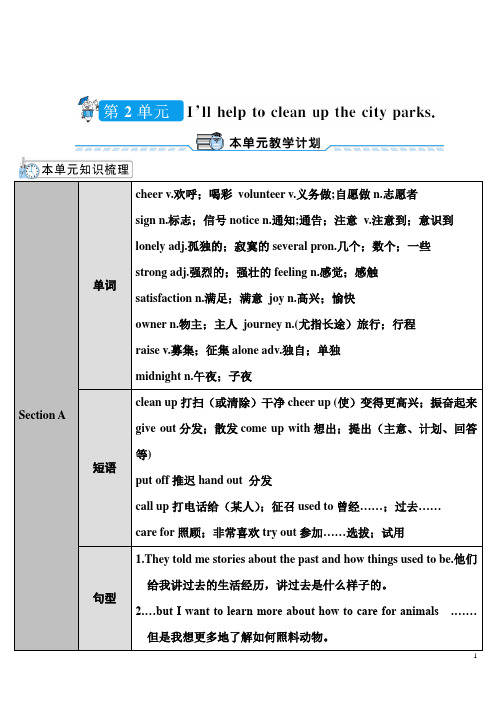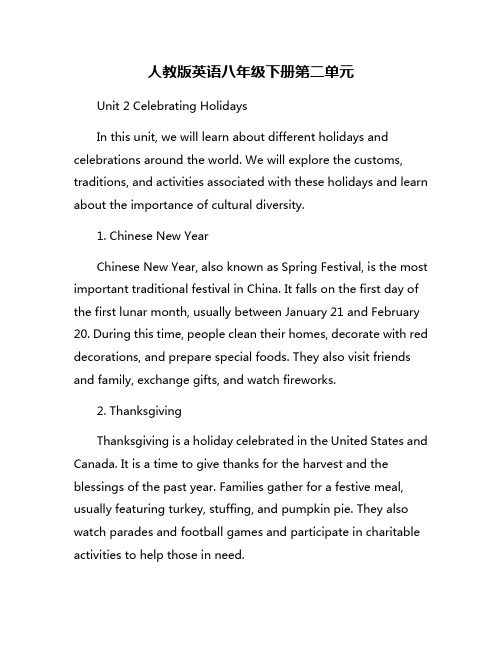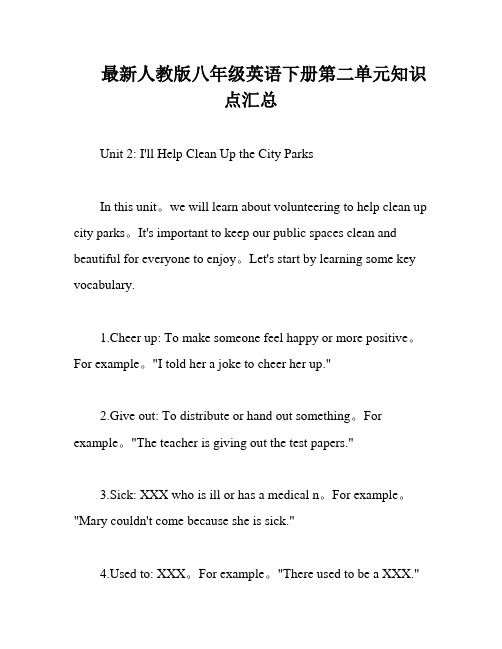初中英语人教版八年级下册第二单元
人教版初中八年级英语下册第二单元Unit 2 教案含教学反思

Section A 单词cheer v.欢呼;喝彩volunteer v.义务做;自愿做n.志愿者sign n.标志;信号notice n.通知;通告;注意v.注意到;意识到lonely adj.孤独的;寂寞的several pron.几个;数个;一些strong adj.强烈的;强壮的feeling n.感觉;感触satisfaction n.满足;满意joy n.髙兴;愉快owner n.物主;主人journey n.(尤指长途)旅行;行程raise v.募集;征集alone adv.独自;单独midnight n.午夜;子夜短语clean up打扫(或清除)干净cheer up (使)变得更高兴;振奋起来give out分发;散发come up with想出;提出(主意、计划、回答等)put off推迟hand out 分发call up打电话给(某人);征召used to曾经……;过去……care for照顾;非常喜欢try out参加……选拔;试用句型1.They told me stories about the past and how things used to be.他们给我讲过去的生活经历,讲过去是什么样子的。
2.…but I want to learn more about how to care for animals.……但是我想更多地了解如何照料动物。
句型1.I’m sure you know that this group was set up to help disabled people like me.我确定你知道这个团体是为了帮助像我这样的残疾人而建立的。
2.You helped to make it possible for me to have Lucky.有了你的帮助,我才有可能拥有“幸运儿”。
3.I’ll send you a photo of him if you like,and I could show you how he helps me.如果你喜欢,我会把它的一张照片寄给你,并可以让你看看它是怎样帮助我的。
人教版八年级英语下册第二单元

Unit2 I’ll help clean up the city parks.【教材依据】本单元是人教版初中英语新教材八年级下册第二单元,本单元的核心话题为“volunteering”,通过本单元的学习,使学生能向别人提供帮助,争做一名志愿者。
【设计思路】本单元的中心话题是提供帮助,围绕着主动提供帮助以及志愿活动展开生动、活泼的对话和阅读,以观察图片、听力理解、阅读理解等训练方式和独立学习、合作交流、完成任务等形式完成目标语言的输入,学习“I will …”,“I would like…”等句型和一些重要动词短语为主要学习内容,并且设置任务型综合性语言实践活动,让学生在交际活动中,学会如何正确地用英语表达自己的意见和建议,重在培养学生的习得语言运用能力、实践能力、合作能力及创新意识。
由于本单元的这些志愿活动与我们的生活密切相关,通过本课的学习,还要求学生能够谈论自己帮助别人的方式,学会关心社会,关爱他人。
引导学生体会志愿活动,投身于社会公益事业。
根据新目标对学生交际能力的培养,我将本课设计为一堂听说课。
但对于八年级的学生可能已经不像七年级学生那样热衷于普通的课堂活动,所以设计怎样的课堂活动,采取怎样的评价方式来提高课堂气氛,从而使学生自然地融入整个教学环节显得尤为重要。
【设计重点和难点】根据教材的内容和学生的实际情况,我们可以围绕“我爱矿区,我要成为矿区志愿者的一员,尽自己的能力去帮助身边需要帮助的人”这一在中心思想来开展一系列教学活动。
在培养学生听、说、读、写能力的基础上,培养学生爱家乡,爱矿区,形成健康的人生观,为他们的终身学习和发展打下良好的基础。
本课时主要运用动词词组围绕“volunteer”展开话题,怎样在规定的时间内通过什么样的活动来激发学生的学习热情,让学生自然地学会运用如此多的动词词组,并成为课堂教学的主角是这一课时的难点。
【教学目标】1 .Knowledge objects(1) Key vocabularyclean up, hunger, cheer up, give out, volunteer, homeless, come up with, put off, hand out, call up, sign, lonely, used to(2) Target languageI’d like to work outside.You could give out food at a food bank.You should care for them.2. Ability objects(1)Train the students to express offering to help with the target language.(2) Train the students’ listening skill.3. Moral object: offer help to the others as much as possible.【重点难点】教学重点:1,能熟练掌握本课时的词汇及句型。
人教版英语八年级下册第二单元

人教版英语八年级下册第二单元Unit 2 Celebrating HolidaysIn this unit, we will learn about different holidays and celebrations around the world. We will explore the customs, traditions, and activities associated with these holidays and learn about the importance of cultural diversity.1. Chinese New YearChinese New Year, also known as Spring Festival, is the most important traditional festival in China. It falls on the first day of the first lunar month, usually between January 21 and February 20. During this time, people clean their homes, decorate with red decorations, and prepare special foods. They also visit friends and family, exchange gifts, and watch fireworks.2. ThanksgivingThanksgiving is a holiday celebrated in the United States and Canada. It is a time to give thanks for the harvest and the blessings of the past year. Families gather for a festive meal, usually featuring turkey, stuffing, and pumpkin pie. They also watch parades and football games and participate in charitable activities to help those in need.3. DiwaliDiwali, also known as the Festival of Lights, is a Hindu festival celebrated in India and by the Indian diaspora around the world. It marks the victory of light over darkness and good over evil. People celebrate by decorating their homes with colorful lights, candles, and flowers. They also exchange sweets and gifts, perform prayers and rituals, and set off fireworks.4. HanukkahHanukkah is a Jewish holiday that lasts for eight days and nights. It commemorates the rededication of the Holy Temple in Jerusalem and the miracle of the oil that lasted for eight days. Families light a special candle holder called a menorah, exchange gifts, play games, and eat traditional foods like latkes and sufganiyot. They also sing songs and recite prayers to celebrate the holiday.5. Eid al-FitrEid al-Fitr is a Muslim holiday that marks the end of Ramadan, the month of fasting. It is a time for feasting, prayer, and giving to charity. Families gather for a special meal, visit friends and relatives, and exchange gifts. They also attendprayers at the mosque, listen to sermons, and enjoy festive activities like shopping and entertainment.In conclusion, celebrating holidays allows us to learn about different cultures, traditions, and values. It helps us appreciate the diversity of the world and the importance of sharing joy and happiness with others. By learning about and participating in different holidays, we can create a more inclusive and harmonious society for everyone.。
英语八下人教版第2单元作文

英语八下人教版第2单元作文英文回答:
In Unit 2 of the eighth grade English book, we have learned about different cultures and customs. For example, we learned about the Chinese Spring Festival and the American Thanksgiving. Both of these holidays are important in their respective cultures and have their own unique traditions. In China, people celebrate the Spring Festival by having family reunions, eating dumplings, and setting
off fireworks. On the other hand, Americans celebrate Thanksgiving by gathering with family and friends, eating turkey, and expressing gratitude for the blessings in their lives.
中文回答:
在八年级英语书的第二单元中,我们学习了不同的文化和习俗。
例如,我们学习了中国的春节和美国的感恩节。
这些节日在各自的
文化中都非常重要,并且有着各自独特的传统。
在中国,人们通过
家庭团聚、吃饺子和放鞭炮来庆祝春节。
而在美国,人们通过与家人和朋友聚在一起、吃火鸡,并表达对生活中的祝福之情来庆祝感恩节。
八年级下册第二单元知识点梳理

八年级下册第二单元知识点梳理初中英语PEP人教版知识归纳Unit2I’ll help to clean up the city parks.【重点单词】clean up 打扫(清除)干净cheer [tʃiə] v. 欢呼cheer up 变得更高兴,振奋起来give out 分发,散发volunteer [ˌvɔlənˈtiə] n. & v. 志愿者;义务做come up with 想出,提出put off 推迟sign [saɪn] n. 标记,符号,标牌notice [ˈnəʊtɪs] n. & v. 通知,公告;注意到hand out 分发call up 打电话给…某人,征召used to do sth. 过去常常做某事lonely ['ləʊnlɪ] adj. 孤独的,寂寞的care for 照顾,非常喜欢several [ˈsevrəl] prep. 几个,数个,一些strong [strɒŋ] adj. 强壮的,强烈的feeling [ˈfi:lɪŋ] n. 感觉,感触satisfaction [ˌsætɪs'fækʃn] n. 满足,满意joy [dʒɔɪ] n. 高兴,愉快owner [ˈəʊnə(r)] n. 所有者,物主try out 参加…选拔,试用journey ['dʒɜ:nɪ] n. (尤指长途)旅行,行程raise [reɪz] v. 抬起,举起,筹集,征集alone [əˈləun] adv. 独自地,孤独地repair [riˈpɛə] v. 修理,修补fix [fiks] v. 修理,安装fix up 修理,修补give away 赠送,捐赠take after (外貌或行为)像broken ['brəʊkən] adj. 破损的,残缺的wheel [wi:l] n. & v. 轮子,车轮;旋转letter [ˈletə] n. 信件,字母Miss [mɪs] n. 小姐set up 建立,设立disabled [disˈeibəld] adj. 有残疾的,丧失能力的make a difference 影响,有作用blind [blaɪnd] adj. 盲的,盲目的,失明的deaf [def] adj. 聋的imagine [ɪˈmædʒɪn] v. 想象,设想difficulty ['dɪfɪkəltɪ] n. 困难open [ˈəʊpən] v. 打开door [dɔ:] n. 门carry ['kærɪ] v. 携带,搬运train [treɪn] v. 训练,培养training [ˈtreɪnɪŋ] n. 训练,培训excited [ɪkˈsaɪtɪd] adj. 激动的,兴奋的kindness [ˈkaɪndnəs] n. 仁慈,善良,亲切,善意clever [ˈklevə] adj. 聪明的,机灵的understand [ˌʌndəˈstænd] v. 懂,理解change [tʃeɪndʒ] n. & v. 改变interest ['ɪntrəst] n. & v. 感兴趣;兴趣sir [sɜ:(r)] n. 先生madam ['mædəm] n. 夫人,女士【重点短语】1.Clean-Up Day 清洁日2. an old people’s home 养老院3. help out with sth.帮助解决困难4. used to过去常常......5. care for 关心;照顾6. the look of joy 快乐的表情7. at the age of 在......岁时8.clean up 打扫(或清除)干净9. cheer up (使)变得更高兴;振奋10. give out 分发;散发11. come up with 想出;提出12. make a plan 制订计划13. make some notices 做些公告牌14. try out 试用;试行15. work for 为…工作;为…. 效力16. put up 建造;举起;张贴17. hand out 分发;散发;发给18. call up 打电话;召集19. put off 推迟;延迟20. for example 比如;例如21. raise money 筹钱;募捐22. take after 与......相像;像23. give away 赠送;捐赠24. fix up 修理;修补;解决25. be similar to 与……相似26. set up 建立;设立27. disabled people 残疾人28. make a difference 影响;有作用29. be able to 能够30. after-school reading program 课外阅读项目【重点句型】1. The boy could give out food at the food bank. 这个男孩可以在食品救济站分发食物。
最新人教版八年级英语下册第二单元知识点汇总

最新人教版八年级英语下册第二单元知识点汇总Unit 2: I'll Help Clean Up the City ParksIn this unit。
we will learn about volunteering to help clean up city parks。
It's important to keep our public spaces clean and beautiful for everyone to enjoy。
Let's start by learning some key vocabulary.1.Cheer up: To make someone feel happy or more positive。
For example。
"I told her a joke to cheer her up."2.Give out: To distribute or hand out something。
For example。
"The teacher is giving out the test papers."3.Sick: XXX who is ill or has a medical n。
For example。
"Mary couldn't come because she is sick."ed to: XXX。
For example。
"There used to be a XXX."5.Volunteer: A person who offers to do something without being paid。
For example。
"The girls could volunteer in an after-school study program."6.Such: Used to describe something specific or of a particular type。
人教版八年级英语下unit2ppt课件
4. With no one to talk to. He _f_e_e_ls_ very _l_o_n_e_ly_ ( 感觉很孤独).
5. The life _u_s_e_d_ _t_o_ _b_e_ (曾经是) very interesting in my school days.
18
to be
I__c_o_u_ld__h_e_lp__t_h_e_o_l_d____________ __p_e_o_p_l_e_c_r_o_s_s_t_h_e_s_t_re_e_t_. _.
I_c_o_u_ld__s_e_n_d_b__o_o_k_s_t_o_t_h_e_p_o_o_r____ __st_u_d_e_n_t_s_______________.
listen to them and care for them.
Helen: You’re right. I mean, we’re all going to be old
one day, too.
12
1. They told me stories about the past and how things used to be. used to do sth. 过去常常做某事; 表示 过去习惯性、经常性的动作或状态, 暗指现在已经不存在。used无人称和 时态的变化。
Imagine you are a bird, what will you do? Though there are difficulties ,we still work har It is normal to feel like this.
He needs much training to be a good player. Thanks for your kindness.
八年级下册人教版英语第二单元2d知识点
八年级下册人教版英语第二单元2d知识点英语作为一门重要的外语,在我们的学习生活中扮演了重要的角色。
对于初中生来说,学习英语是日常学习的重点之一。
八年级下册人教版英语第二单元2d知识点也是我们学习中的重头戏,掌握这些知识点对于我们的英语学习是至关重要的。
在本文中,我将和大家一起学习八年级下册人教版英语第二单元2d知识点,希望能对大家的英语学习有所帮助。
一、过去完成时的用法过去完成时表示在过去某个时间或动作之前已经发生了另一个动作或存在了一个状态。
它的结构是“had + 过去分词”,例如:“I had finished my homework before I went to bed.”二、虚拟语气的用法虚拟语气是表示一种假设、虚构或不可能实现的情况。
它的常用结构是:“if + 过去式,would/could/should + 动词原形;现在将来式”,例如:“If I had enough money, I would buy a car.”三、倒装语序英语中有很多种倒装语序,通常情况下是为了加强语气或者使语句更加清晰易懂。
例如:“Not only did he study En glish, but he also learned French.”四、固定搭配的用法英语中存在大量的固定搭配,掌握这些固定搭配对于我们的英语学习是非常有帮助的。
例如:“make friends”、“take part in”等。
五、情态动词的用法情态动词通常表示说话者的态度、意图、能力、推测等,它们有“can, could, may, might, must, shall, should, will, would”等。
例如:“I can swim very well.”总之,八年级下册人教版英语第二单元2d知识点是我们英语学习中的重点之一。
要想掌握这些知识点,我们需要抓住重点,勤加练习,多听多读多记多练,相信我们的英语水平一定会不断提高。
人教版八年级下册英语第二单元unit2知识点
人教版八年级下册英语第二单元unit2知识点Unit 2 What should I do?一丶重点短语1.argue v.争论;争吵argue with sb.与某人吵架I argued with my best XXX.我和我的好朋友吵架了。
2.① XXX.(用于否定句)也He doesn’t have any money。
and I don’t。
either.他没有钱,我也没有。
I can’t play chess。
She can’t。
either.我不会下国际象棋,她也不会。
② too 也(用于肯定或疑问句)I’m XXX a XXX。
too.我是老师,他也是老师。
3.ask (sb.)for sth.向某人寻求某物;要……Don't ask for food every day.Go and find some work.别天天要饭,找点儿工作做。
I don’t think you should ask your parents for some money.我想你不应向父母要钱。
4.the same as。
与……相同(注意前后两个比较对象的属性保持一致)XXX same asmy friends'.这些衣服与我朋友的一样。
Tom is the same age as Anna.=Tom is as old as Anna.汤姆和XXX一样大。
Her backpack is the same as XXX.她的背包与我的一样。
5.except除……之外;(不包孕……在内)My class has been XXX.除我之外,我的同砚都被约请了。
All the students went to the park except him.除他之外,部分同砚都去过公园了。
XXX.除了她以外,所有的学生都去美国旅行过。
注意区别:besides除……以外,还有。
(包括在内)We all went there besides him.除他去以外,我们也都去了。
八下英语人教版第二单元范文
八下英语人教版第二单元范文英文回答:How to Improve Your English Speaking Skills.To become a confident and fluent English speaker, consistent effort and effective practice are essential. Here are some proven strategies to enhance your speaking abilities:Immerse Yourself in the Language:Expose yourself to English as much as possible. Listen to podcasts, watch movies or TV shows, and read books, newspapers, or magazines in English. The more familiar you become with the sounds and structures of the language, the easier it will be to speak it naturally.Engage in Active Listening:When listening to native speakers, pay close attention to their pronunciation, intonation, and the way they use grammar. Try to understand the message they are conveying, as well as the emotions and nuances they express through their tone of voice.Practice Regularly:Regular speaking practice is crucial. Findopportunities to have conversations with native or non-native English speakers. Join a conversation group, attend language classes, or find a language partner to practice with. The more you speak, the more comfortable and fluent you will become.Focus on Fluency over Perfection:Don't be afraid to make mistakes. The goal of conversation is communication, not perfection. Focus on conveying your message clearly and effectively, rather than trying to speak perfectly. Over time, with consistent practice, your accuracy will improve.Use a Variety of Vocabulary:Expand your vocabulary by learning new words and phrases from different sources. Use them in your conversations to make your speech more interesting and avoid repetition. Use synonyms or expressions to express your ideas in a more nuanced way.Use Correct Grammar:While it's important to focus on fluency, basic grammar rules should be observed to maintain clarity and avoid misunderstanding. Study grammar rules, but don't get bogged down in technicalities. Focus on understanding the core concepts and applying them in your speech naturally.Seek Feedback:Ask native speakers or experienced English learners to provide feedback on your speaking. They can point out areas for improvement, such as pronunciation, grammar, orvocabulary usage. Constructive criticism can help you identify weaknesses and make progress.Embrace the Culture:Understanding the culture associated with the English language can enhance your speaking skills. Learn about the customs, values, and traditions of English-speaking countries. This will help you use language appropriately in different situations and avoid misunderstandings orcultural faux pas.Be Patient and Persistent:Learning to speak English fluently takes time and effort. Don't get discouraged if you don't see immediate progress. Stay persistent, continue practicing, and celebrate your gradual improvements along the way.Additional Tips:Use online language learning apps or software.Watch videos or tutorials on English pronunciation.Record yourself speaking and listen back to identify areas for improvement.Take advantage of speech recognition technology to practice your pronunciation.Remember, effective English speaking skills are a journey, not a destination. With dedication and consistent practice, you can achieve fluency and communicate confidently in this global language.中文回答:如何提高英语口语能力。
- 1、下载文档前请自行甄别文档内容的完整性,平台不提供额外的编辑、内容补充、找答案等附加服务。
- 2、"仅部分预览"的文档,不可在线预览部分如存在完整性等问题,可反馈申请退款(可完整预览的文档不适用该条件!)。
- 3、如文档侵犯您的权益,请联系客服反馈,我们会尽快为您处理(人工客服工作时间:9:00-18:30)。
Unit 2 I’ll help to clean up the city park.Section A 1 (1a-2d)一、教学目标:1. 语言知识目标:1) 能掌握以下单词:clean up, city, cheer, cheer up, give out, volunteer, notice, used to, lonely, 能掌握以下句型:①You could help to clean up the city parks.②We should listen to them and care for them.2) 能了解以下语法:情态动词could, should的用法;用should或could提出建议并对别人的建议作出评价。
如何表达主动提供帮助。
二、教学重难点1. 教学重点:1) 掌握这些短语动词的构成和用法:clean up, city, cheer, cheer up, give out,volunteer, notice, used to, lonely2) 学会提供帮助的基本句型:I’d like to work outside.I’ll help clean the city park.You could give out food at a food bank.2. 教学难点:学会提供帮助的基本句型三、教学过程Step 1 Warming up1. 播放学生志愿者进行义务帮助别人的活动视频,通过询问他们以下问题来引导学生们了解社会上一些的志愿们进行的活动。
…Step 2 New words1. city n. 城市2. notice n. 公告牌;通告;布告3. sign n. 标志;信号4. volunteer v. 义务劳动,自愿做volunteer to do sth. 义务自愿做某事e.g. Many people5. clean up 打扫;清除。
6. give out 分发;散发7. cheer v. 欢呼; 喝彩8. lonely adj. 孤独的;寂寞的9. used to 曾经,过去Step 3 Discussion1. 1a. Look at the ways you could help others. Then list other ways.2. Ss discuss with their partners and write the ways one could help others: ①Help plant trees by the river.②Help clean up the city park.③Visit the old people in the old people’s home.④Help young kids to learn English.Step 4 Listening1. T: Tell Ss to read the sentences in the chart. Make sure they know the meaning ofthe sentence2. 1b. Play the recording for the Ss to listen and number the ways the boy and girl could help others.(Key: 3, 2, 4, 1)Step 5 Pair work1. Let Ss read the conversation in the picture.2. 1c. Use the information in the chart of 1b to make other conversations.A: I hope to work outside.B: You could help to clean up the city parks.……3. Let some pairs act out their conversations.Step 6 Listening1. 2a:T: A group of students are planning a City Park Clean-up Day. Listen and check (√) the things they are going to do to tell people about it.1. Look at the pictures in 2a. Discuss the things they are going to do.2. Play the recording for the Ss to listen and check the pictures.3. Play the recording again to check the answers.Answers: b, c, e2. 2b:1. Let Ss read the sentences below. Explain some main sentences for the Ss. Make sure they know what to do.2. Play the recording for the Ss to write the correct words in the blanks.1. We need to _____ ___ ____ a plan to tell people about the city park clean- up.2. Clean-up Day is only two weeks from now. We can’t ___ ___ making aplan.3. We could ___ ___ signs.4. Let’s make some notices, too. Then I’ll ____ them ____ after school.5. We could each ____ ___ 10 students and ask them to come.3. Play the recording again to check the answers.Answers: 1. come up with 2. put off 3. put up 4. hand, out 5. call up Step 7 Pair work1. 2c. Tell Ss to make a conversation using the information in 2a and 2b.2. Let one pair to read out their conversation first.e.g.Step 9 Language points1. They told me stories about the past and how things used to be.used to do sth. 过去常常做某事;表示过去习惯性、经常性的动作或状态,暗指现在已经不存在。
used无人称和时态的变化。
e.g. I used to go to the Youth Center. But I have no time now.我过去经常去青少年中心,但现在我没有时间了。
Grandparents used to tell us stories when we were very young. 在我们小时候祖父母常给我们讲故事听。
2. Yeah, a lot of old people are lonely.lonely adj. 孤独的;寂寞的指精神上感觉孤独、寂寞。
e.g. The old man feels lonely, so he raises a dog.那名老人觉得很孤独,因此他养了一只狗。
3. We need to come up with a plan for the City Park Clean-up Day.need 用作实义动词,有“必要”、“必需”之意,有人称、数和时态的变化,可以接名词、代词、动名词或带to 的动词不定式作宾语。
e.g. The man needs an English dictionary when he works.这个人在工作时需要一本英语词典。
Do you need to see him yourself?你必需亲自见他吗4. clean up 意为“打扫;清理”。
但如果在clean 和up间加个连字符号, 它就是名词了, 意为“扫除”。
e.g. You must give your classroom a good clean-up.你必须对教室进行彻底地打扫。
come up with 提出(观点,看法)。
e.g. He’s come up with a great idea. 他想出了一个绝好的办法。
I came up with a better plan than that. 我提供了一个比那还好的计划。
Step 10 ExercisesⅠ. Fill in the blanks.1. He helps ____ the classroom.A. cleans upB. cleaning upC. clean up2. I took her to the concert to ____.A. cheer up herB. cheer her upC. cheer she up3. Let’s help ___ food at the food bank.A. to give outB. give upC. giving outⅡ. Complete the sentences.1. You’d better _____ ___ ____ (想出) a better plan.2. Who will ________ ___ ______ (自愿回答) this question?3. You could put up a ______ (布告) here.4. With no one to talk to. He _____ very ______ ( 感觉很孤独).5. The life _____ ___ ___ (曾经是) very interesting in my school days. Answers: C, B, Acome up with, volunteer to answer, notice, felt lonely, used to beHomework:Write three conversations about your discussions with your classmates. A: I’d like to he lp the old. What could I do?B: You could give them medical service.?s.。
